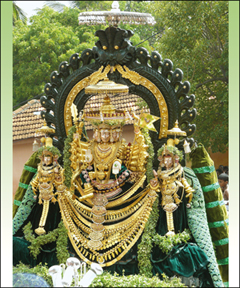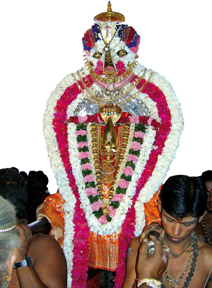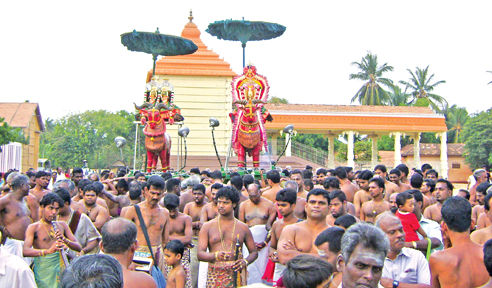Deepavali - prelude to the ‘divine war’
by Ananth PALAKIDNAR
Deepavali, the festival of lights, is celebrated by Hindus all over
the world with pomp and pageantry.
 |
|
Warrior God Skanda with his consorts
Devayani and Valli. |
However, according to sociologists, the lamps that were lit in the
ancient days during the North-East monsoon season to keep away the dark
gloomy atmosphere in the Indian subcontinent had later turned into a
festival with the addition of the spiritual touch.
Vaishnavites and Saivaities, the two prime sects in Hinduism,
consider Deepavali a holy festival celebrating the victory of spiritual
power over evil forces.
South India and Sri Lanka, with the majority of Hindus of the
Saivaite sect who worship God Siva as their almighty and the majority of
Hindus of the Vaishnavite sect, mostly from the northern parts of the
Indian subcontinent worshipping Krishna and Rama, the heroes of the
Hindu epics Mahabharatha and Ramayana as their Gods, observe Deepavali
in various forms of celebration.
However, the spiritual importance of Deepavali is hardly seen in the
celebrations with the focus on merry making, similar to festivals
celebrated in the West. In India and other parts of the world, the
Deepavali festival has been very much commercialised, gradually losing
its spiritual significance.
In the good old days in Jaffna, Deepavali remained a highly revered
festival in the Hindu calendar. The `Yaldevi’ train which travelled
between the North and South carried the people of Jaffna who were
residents in various parts of the country to Jaffna for Deepavali.
Fasting
For many Saivaite Hindus who form the majority in Jaffna, Deepavali
is merely a festival of celebration. But the more pious Saivaite Hindus
begin to observe the arduous fasting known as Skanthashasti, the day
after Deepavali.
Skanthashasti fasting observed for six days with devotees consuming
only a glass of milk or pepper and water daily after sunset, is a form
of prayer offered to God Skanda (Katharagama god).
The Hindu devotees who observe this fasting for six days spend the
day-time at the temple and return home after sunset to break their fast
by consuming milk or pepper with water. According to Saivaite Hindus,
the true meaning of observing the highly spiritual Skanthashasti fasting
is to purify the mind and body to face the challenges in the
materialistic world spiritually.
 |
|
Vel - the spear of God Skanda is
worshipped at Nallur Kanthaswamy Temple, Jaffna. |
The day after Deepavali, most of the Hindus in Jaffna clean their
homes and begin the Skanthashashti fasting with the sunrise and continue
till sunset.
The fasting will continue for six days. On the final day, the
devotees will gather at Skanda temples to see the war festival.
In South India and in Sri Lanka, particularly in Jaffna, the war
festival at the end of the Skanthashasti fasting is held in every Skanda
temple with the participation of thousands of devotees.
The war festival depicts how the Warrior God Skanda annihilated the
Demon King Soorapathman who made the lives of his devotees miserable.
War festival
The Nallur Kanthaswamy temple in Jaffna is famous for the `war
festival’ which is known in Hinduism as Soorasangaram (the destruction
of Demon King Soorapathman). It is on the broad streets around the
temple premises of Nallur that the `war festival’ takes place, with one
section of devotees carrying the statue of God Skanda and the other
section of devotees carrying the statue of the Demon King Soorapathman.
The `mock war’ between God Skanda and the Demon King Soorapathman is
staged with great devotion, to the sounds of drums and bugles.
The devotees who observed the Skanthashasti fasting chant devotional
songs praising God Skanda while the divine battle is in progress.
According to Hinduism, God Skanda was created by God Siva from his
`third eye’ with all powers granted to destroy Demon King Soorapathman.
The demon king also possessed evil powers and challenged God Skanda,
who was the son of God Siva.
During the war to defeat the warrior God Skanda, the Demon King
appeared in disguise as an elephant and lion, before finally coming out
in his true form.
 |
|
Soon after the Deepavali festival the
Skanthashasti fasting begins and continues for six days.Here
in the historic Nallur Kanthaswamy temple in Jaffna deities
are taken around the temple streets during the fasting
period. |
So when the war festival is in progress, the different forms of the
Demon King are also brought into the scene, with God Skanda destroying
all three of his opponent’s different forms one after the other with his
spear.
Total annihilation
The `war festival’ on the streets around the temple will last for
nearly two hours and the final part of the divine battle ends with the
total annihilation of the Demon King Soorapathman.
The story of God Skanda is known as Skandapurana. The Saivaite sect
in Hinduism believes that God Skanda liberated his innocent devotees
from the demon king and blessed them with the freedom which had been
denied to them under the clutches of the demon king.
The demon king was made to be reborn as a peacock by God Skanda after
he was killed.
Later, the Warrior God reached Kataragama in the Southern tip of Sri
Lanka, creating his shrine with his consort Valliamma, to bless the
devotees who came to worship him.
Therefore, the Deepavali celebrations in the Southern part of the
Indian subcontinent followed by the Skanthashasti fasting is a prelude
to the `divine war’ which depicts Warrior God Skanda’s victory over the
deadliest Demon King Soorapathman and the liberation of the innocents. |

